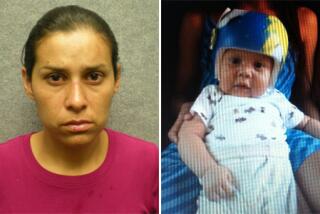Jury Deadlocks on Sanity Issue in Baby’s Death
- Share via
The jurors charged with deciding whether Francisca Sanchez Jimenez was insane when she killed her newborn baby said they were hopelessly deadlocked Wednesday and a mistrial was declared.
The Ventura County Superior Court jury was split 8 to 4, with the majority believing that Jimenez was sane when she left her baby to die in the waste tank of a portable toilet.
Judge Lawrence Storch scheduled a hearing for July 1 to determine when Jimenez--an illiterate, 23-year-old farm worker who once lived in Oxnard--will be retried on the sanity issue.
The mistrial marked the second time that a jury has deadlocked in the Jimenez case, which began in July, 1991, with the discovery of the baby boy’s body in a portable toilet used by farm workers in Saticoy. Investigators eventually charged Jimenez with attempting to murder another newborn child in an earlier incident in Oxnard.
After a four-week trial, the first jury deadlocked Feb. 14 on both charges, with the majority favoring conviction.
The second jury heard evidence for nearly six weeks before convicting Jimenez on May 29 of second-degree murder and acquitting her of attempted murder.
Those jurors returned to court this week to hear evidence on Jimenez’s plea of not guilty by reason of insanity. The jurors also could consider the evidence that they heard during the guilty phase of the trial. In the sanity proceeding, however, the burden of proof rested with Jimenez’s attorney, Deputy Public Defender Jean L. Farley.
Farley’s only witness at the sanity proceeding, psychologist Jose J. LaCalle, testified that Jimenez was mildly mentally retarded and suffered a schizoid personality disorder. He said she was mentally overwhelmed when she gave birth in the toilet and could not form a rational decision.
Prosecution psychiatrist Donald Patterson insisted that there was nothing about Jimenez’s mental state to preclude her from knowing right from wrong.
One juror said Wednesday that he did not believe that Farley had met her burden of proof. The juror, who asked not to be identified, said Jimenez’s actions before and after giving birth indicated that she knew what was happening.
But he said the four jurors in the minority “sincerely felt that the evidence showed she was insane at that time.”
“Their view was that she pretty much must have been,” the juror said. “It’s very difficult for people to believe that someone could do that and still be a rational, thinking human being. . . . There was no other explanation that they could accept.
“We all believed she was at least mildly mentally retarded,” the juror added, but most felt that the retardation did not constitute the necessary mental defect required by the law governing insanity pleas.
The juror said the entire panel was turned off by LaCalle’s testimony.
“Several jurors were quite upset because, especially during cross-examination, rather than help us understand and clarify things, he seemed almost to want to cloud things, to make it more difficult for us to do our job,” the juror said.
He said several jurors believed that Patterson had not made a thorough examination of the defendant--a point that Farley made in her closing argument.
Farley said LaCalle believed “very, very strongly” in his opinions but said she had no quarrel with the jurors’ impressions of his testimony.
“The information that jurors are willing to give the lawyers is the most valuable we can get,” she said, adding that she has begun a search for additional experts for the next trial.
Farley said she also is researching whether the second-degree murder conviction is valid, given the deadlock on the insanity plea. But Deputy Dist. Atty. Carol J. Nelson said there is “absolutely no doubt in my mind.”
“She has the burden of proving that (Jimenez) is not guilty by reason of insanity,” Nelson said. “Until she does so, the lady is presumed sane and is convicted of murder.”
Farley said the legal system is a mystery to Jimenez. After Wednesday’s mistrial, Farley said, Jimenez asked how much prison time the jury had given her.
“I have spent more time with this client than any client I have ever represented,” Farley said, referring to difficulties that she has had explaining things to Jimenez.
The juror who agreed to be interviewed said many jurors “felt very strongly that this unfortunate woman needs help, but we weren’t in a position to decide that.”
More to Read
Sign up for Essential California
The most important California stories and recommendations in your inbox every morning.
You may occasionally receive promotional content from the Los Angeles Times.










